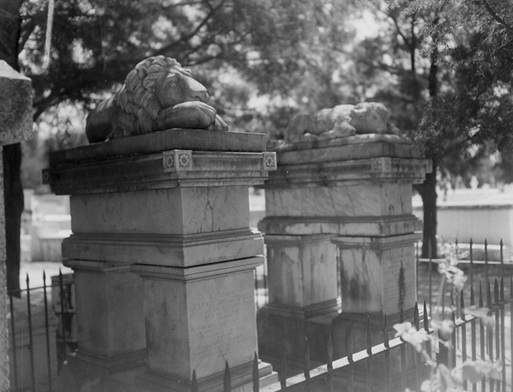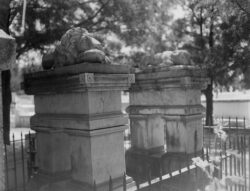Jacques Dupré
Jacques Dupré;, a Whig, served as acting governor of Louisiana from January 14, 1830, to January 31, 1831.

Courtesy of The Historic New Orleans Collection
Grave of Jacques Dupre. Fontenot, Ruth Robertson (Photographer)
J acques Dupré, a Whig,served as acting governor of Louisiana from January 14, 1830, to January 31, 1831. He was the fifth man to serve as governor in less than seven years, assuming the position after Pierre Derbigny died in office in 1829. Initially, senate president Armand Julie Beauvais was chosen to serve out Derbigny’s term, but Beauvais resigned two months later, resulting in Dupré’s advancement. Confusion about order of succession initiated a constitutional crisis, eventually resulting in a special election for governor in 1831.
Jacques Dupré was born in New Orleans on February 12, 1773, the oldest son of Laurent Dupré de Terrebonne and Marie Josèphe Fontenot Dupré. They resided in Opelousas in St. Landry Parish, and Jacques was baptized at Pointe Coupée Post. His father died in 1783 and his mother remarried “Grand Louis” Fontenot, the largest cattle rancher in the Opelousas district.
In 1791 Spanish officials awarded Dupré a land grant of forty arpents (about 192 English feet) of frontage property on Bayou Boeuf. He married Théotiste Roy of Pointe Coupée, at Opelousas, on May 19, 1792, with whom he had seven children. Dupré became skilled in the languages of nearby Native American tribes. In 1813 he established a partnership with Pierre Heno of New Orleans in a commercial boucherie (butchery), and was reputed to be largest cattle rancher in Louisiana by the 1820s. During the War of 1812, he served as a major in the Sixteenth Regiment of the Louisiana Militia from January 3 to March 15, 1815, and fought in the Battle of New Orleans.
Dupré served in the Louisiana House of Representatives from 1817 to 1818 and again from 1823 to 1825. He also served in the state senate from 1828 to 1846. In 1830 Dupré was elected president of the senate after Arnaud Beauvais vacated the office to assume the governorship when Pierre Derbigny died. Beauvais resigned two months later, however, and Dupré became Acting Governor.
During his short term, Dupré attempted to strengthen the state’s infrastructure. A Merchant’s Insurance Company was begun in New Orleans to protect the assets of that growing segment of the economy. The Railroad Company of Pontchartrain was incorporated and the state capital moved from Donaldsonville back to New Orleans.
Dupré did not run for re-election in 1831, choosing to return to his seat in the senate. He remained there until his death on September 14, 1846. He was interred in the St. Landry Roman Catholic Church Cemetery in Opelousas.
This entry was adapted from the Dictionary of Louisiana Biography, a publication of the Louisiana Historical Association in cooperation with the Center for Louisiana Studies at the University of Louisiana, Lafayette.
Sources: Joseph Tregle, “The Governors of Louisiana: Jacques Dupré,” Louisiana History, XXII (1981); Journal of the Louisiana House of Representatives, 1816-1828; Journal of the Louisiana Senate, 1828-1846; Donald J. Hébert, Southwest Louisiana Records, 33 vols. (Eunice, Cecilia, and Baton Rouge, 1974-1984); Family Records in possession of Marie Celeste Robertson Spiess, Opelousas; Orleans Parish Courthouse Records.
